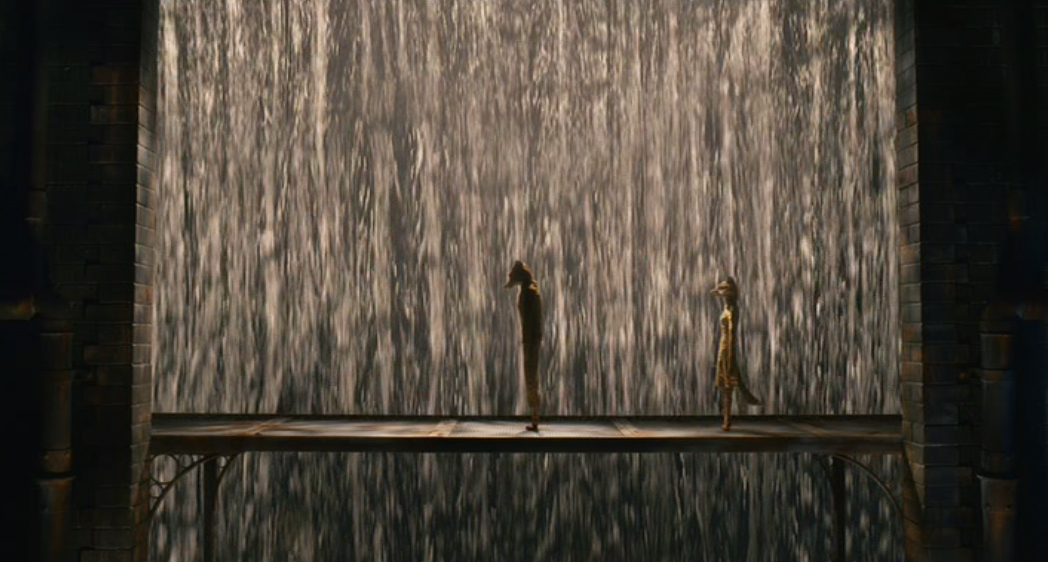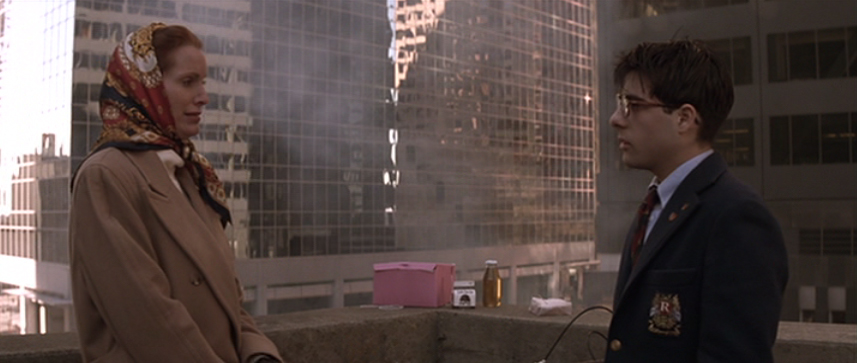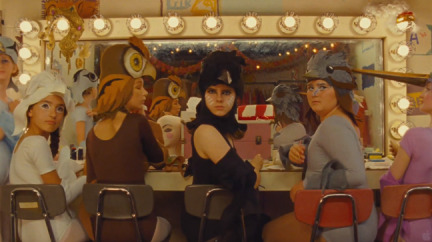Burning Questions: Are We Ignoring Wes Anderson's Dark Side?
 Monday, June 4, 2012 at 5:00PM
Monday, June 4, 2012 at 5:00PM Michael C. here to try to look past the standard take on one of our leading filmmakers.
Steve Zissou: This is going to hurt.
I have decided that I am no longer interested in reading reviews of Wes Anderson films that contain the word “quirky” in the opening paragraph. Same goes for “twee”.

Over and over I read that, what do you know, Wes Anderson has gone and made another Wes Anderson movie. It’s about time, don’t you think, that people take a more substantive look at a one of the most distinctive bodies of work of the last two decades? A body of work whose deeper currents are often ignored amid the same old talk about flat compositions and diorama sets. Anderson’s movies have a lingering impact that defies those would dismiss his carefully composed world as emotionally detached. Right below that carefully composed surface are the deeper currents of a director preoccupied with death, loss, and alienation.
With all the focus on his signature colorful style are we ignoring Wes Anderson’s dark side?
In all his films there is a moment when the material takes a turn and what we took for a fun romp veers into painful territory. There is the gasp-inducing suicide attempt at the center of The Royal Tenenbaums, or the excruciating unbandaging of Owen Wilson in Darjeeling. The death by helicopter crash at the end of The Life Aquatic remains shocking all these repeat viewings later, and even a film as ostensibly fun as The Fantastic Mr. Fox has at its heart the title character’s existential crisis.

The scene that always sticks out strongest in my memory as encapsulating Anderson’s method is a moment about halfway through Rushmore. The feud between Max Fischer and Blume has been escalating just as we would expect it to in a light-hearted comedy starring Bill Murray, when Max invites Mrs. Blume to a secret meeting in order to spill the beans about Blume’s infidelity. It’s a jarring, uncomfortable scene. The actress portraying Mrs. Blume plays it absolutely straight and Anderson acknowledges the break in tone by having Mrs. Blume dismiss Max’s comical offers of premade sandwiches with a sad “Get to the point”. As for many, Rushmore was my first exposure to Anderson's world and I can recall realizing “Oh, this movie isn’t playing around.” Now that I’ve becoming familiar with the directors work over the years I can see clearly how the whole film is colored with loss from Max’s mother to Mrs. Cross’s lost husband to Blume’s distaste for his own family. For all his arch stylistic touches Wes always takes the pain of his characters seriously.
I can hear Anderson’s detractors sniffing derisively. For those who never managed to get on the filmmaker’s wavelength his weightier moments are just another in a series of affected poses. To them he is like the teenager who is suddenly very into the works of Sylvia Plath, wrapping himself in the subject of death as a none-too-subtle attempt to produce the illusion of depth and wisdom. The fact that he dresses in dapper Mr. Fox clothes like he is auditioning for one of his own movies, does not help him to be taken seriously.
I would counter that just as we readily accept comic relief in a heavy film, so too can a seemingly whimsical film contain moments of complete seriousness. That if a director is skilled enough he can maintain his tone while challenging the audience’s expectations of what kind of film they are watching. And that despite the apparent opinions of the modern movie going masses total realism isn’t the only vehicle for dramatic material.
 Moonrise Kingdom (2012)
Moonrise Kingdom (2012)
And now with Moonrise Kingdom Anderson has released his what appears to be one of his lightest films yet. Young people in love stealing away from their dysfunctional homes for a few days of undisturbed happiness on an impossibly charming island town, complete with Ed Norton done up as an overgrown boy scout. And it is that movie, but even Moonrise's moments of utter joy, like the young couple’s glorious dance on the beach, come tinged with the knowledge that their time is fleeting and adult complexity threatens their hideaway paradise from all sides and from within their own swirling emotions. The darkness is always present in Wes Anderson’s world. That he can acknowledge it while still seeing the possibility of warmth, humor and even healing is the reason so many like myself find his world a place we so often want to visit.
Your turn.
Is Wes the hipster-poser his haters say he is? Do critical circles acknowledge his place in the top tier of working directors? You can follow Michael C. on Twitter at @SeriousFilm or read his blog Serious Film.



Reader Comments (13)
Beautifully written piece. I don't find Anderson to be any kind of poser so to speak; he's his own style. A genuine unique article whose style (both physically and emotionally) may follow certain patterns, but nevertheless feature depth.
Darjeeling in particular comes to mind. I know I'm not the only one to point out the flashback scene, but it's a pretty powerful one, with character baring the true feelings.
Nope. Guy is overrated. His films are supposed to be comedies (or at least part comedies) and they're never all that funny.
"a seemingly whimsical film contain moments of complete seriousness.That if a director is skilled enough he can maintain his tone while challenging the audience’s expectations of what kind of film they are watching. "
Amen. In fact, it seems integral. When I rack my brain for some of the saddest moments I've experienced in popular film, I end up with a list of comedies. Nothing breaks my heart more than Disney-Pixar's opening sequence in Up or the final sequence in Toy Story 3. But maybe that's just my sentimental juvenile heart talking.
Regardless, to use the fact that this man has a coherent voice and style as a bludgeon against his artistic cred seems ridiculous.
I've never thought of Anderson's films as just comedies. His films have more layers than that.
SPOILER:
Was anyone else disturbed by the sudden death of the dog in Moonrise Kingdom? What was going on there?
I think I've sussed out what exactly bothers me about Wes Anderson and why I "feel" like I can't stand his movies. But I don't actually dislike his movies, in fact I love The Royal Tenenbaums, Rushmore and Fantastic Mr. Fox. It's his super hipster fans that make me think I dislike his work because of the shear amount of smugness in their conversations about his films.
This happened a lot around the time The Darjeeling Limited came out - which I think is by far his weakest film, saved only by Anjelica Huston's late appearance at the end. I was talking with a group of people and a couple of them started going into the "cultural symbolism and implications" in Darjeeling Limited about India and I wanted to stick knives in my ears.
Anyways, sorry had to get that out in the open. But yes, you're absolutely right that there are dark undercurrents throughout all his work. Really there are only a handful times I felt as disturbed by a movie then when you see the blood flowing down Richie Tenenbaum's arms. And as "quirky" as The Royal Tenenbaums is, it's a pretty stark and sad portrait of a truly dysfunctional family. All of his works have that element that make it more than whimsy, even if I don't love every single one of them.
Amy - Ah, yes. The annoying fans who ruin quality work. That's a subject worthy of its own column right there.
On a side note I tend to single out Aquatic as his weakest effort. But it's a testament to Wes that I still find it to be an endlessly fascinating jumble even with its flaws.
I thought Darjeeling was one of Anderson's strongest films because I've always had a contentious relationship with my brother and related to that subject in the movie. I also thought it was great Anderson got of his contained world and had his characters travel to India.
Gabriel - I also think Wes doesn't get the credit he deserves for evolving as a storyteller because of all the focus on his visuals. Darjeeling had an elliptical, short fiction style narrative very unlike Rushmore or Tenenbaums.
I'm a huge fan of Wes Anderson's work and completely agree with what you've said, I think that the dramatic moments ARE overlooked.
His films may not be for everyone, but in that sense he's kind of like the new Woody Allen. Those that love him REALLY love him and those that hate him REALLY hate him. (Then there will be those that only like one or two of his films, Royal Tenenbaums will likely be his Annie Hall).
In my case I feel that each film he makes is being made just for me. And that makes me very happy.
Speaking of the Rushmore's scene you mentioned above, it's funny because on the screenplay, they had been an actual dialogue of Max Fischer and Mrs Blume about "Mr Blume f*king a schoolteacher and Max really want Mr Blume to get hurt. I think it is probably the darkest moment of all his films. What ends up in the film is quite different. but also funny and seriously at the same time (one of my favorite scenes of his). His films often deal with death theme too (in almost all of his features, someone die)
As a big Wes Anderson's fan, I enjoyed all of his movies. I also think Darjeeling is his weakest and lacks the deep he usually provides but who knows, maybe it'll hit me the next time I watch it.
I think the main reasons people often do not get/ hate his movies are because the main storyline of his films often goes nowhere. The first few times I watched The Royal Tenenbaums I did not really understand what this film IS about. Characters don't seem to change much (or do they?) and in the end their lives are much of the same, or even messier than they were at the start. Only Royal was really changing towards the end. My first reaction was this film was pretty much "style over substance". Only latter viewing did I realize the richly details and the love for his characters and his world.
I saw Moonrise Kingdom last night and it had me thinking about Wes' dark undertones...I can understand if individuals just don't like his style but he attempts to say more than most filmmakers and for me, manages to entertain at the same time. Perhaps he should go for a mostly serious tone at some point, although perhaps his friend, Noah Baumbach is sufficiently covering that ground at the moment.
I've seen three WA films - Tenenbaums, Darjeeling and Zissou.
The only one I've come close to enjoying was Tenenbaums.
As a rule, I find that Anderson's films are filled with unlikable or unsympathetic characters
to whom nothing of interest happens.
Yes, events do occur in his movies -- but I just don't care.
And doing this with actors whose work I otherwise REALLY enjoy
(Willem Dafoe, Jeff Goldblum, Gene Hackman, Angelica Huston, Bill Murray)
just ticks me off.
i second gabriel oak's comment about the dog in moonrise. it was incredibly disturbing to me the dog was killed like that. i had a terrible feeling that it was intended as a joke of sorts, but it was off putting. i don't think i could watch this film again. the dog also died at the end of royal tenebaums. this recurrence seems morbid.